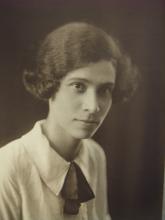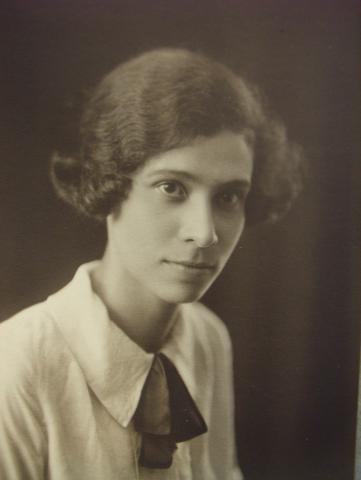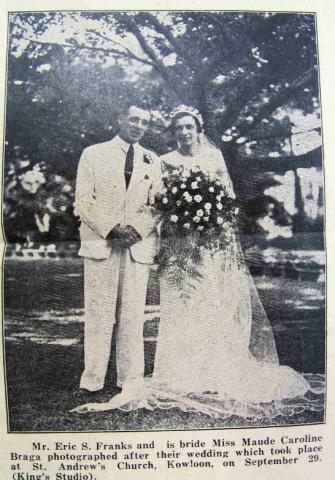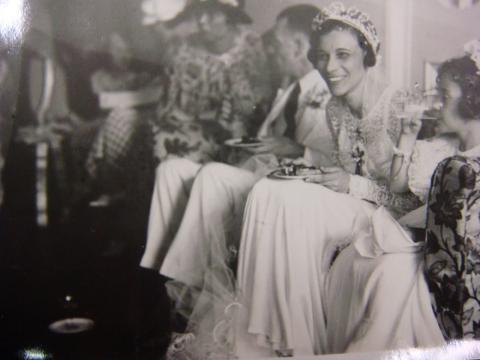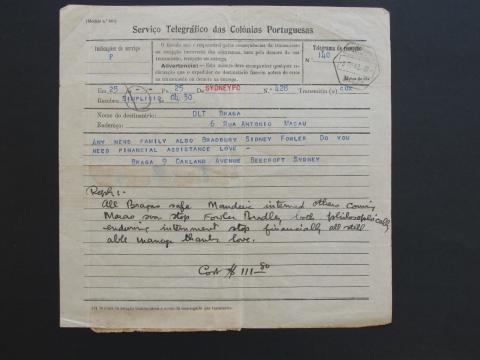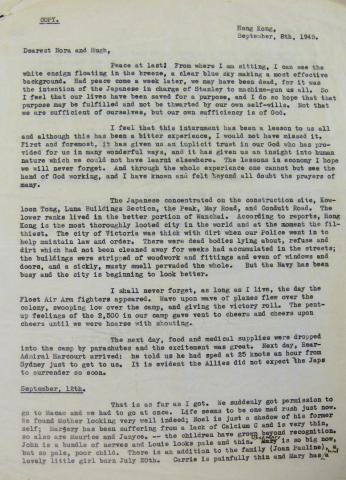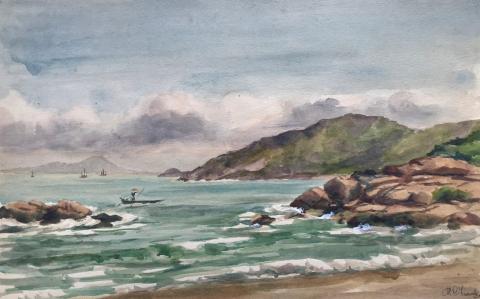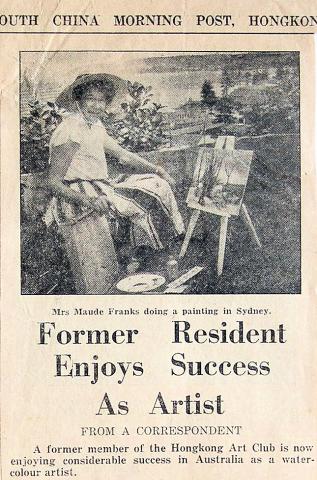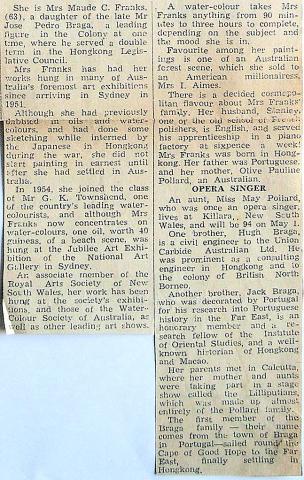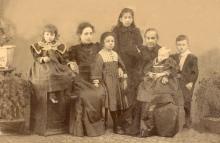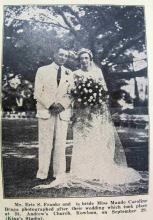Maude Caroline Franks (née Braga)
Born, Hong Kong, 8 December 1898; died, Sydney, 18 October 1962, aged 63.
Artist
Maude (named for her mother's elder sister, Violet Maude, 1867-1959) was the second of four daughters and the third of thirteen children of José Pedro and Olive Pauline (née Pollard). Born in Hong Kong, she attended the Italian Convent, conducted by the Canossian Sisters. She was an energetic, friendly, vivacious person who throughout life, and despite difficult circumstances, retained an infectious enthusiasm for whatever life had to offer. She learned the piano from her older sister Jean and had a lovely singing voice, trained by her mother.
National Library of Australia, Box 1/52.
She was a competent horsewoman and visited Shanghai to compete at a gymkhana there. According to family tradition, she became the first woman in Hong Kong to hold a motor cycle rider's licence - an interesting reflection of changing technology. She had the reputation of being good at everything that she undertook. During the inter-war years, she worked as a secretary for Standard-Vacuum Oil Co. Maude was the only one of the four sisters in her family to marry. Initially, she was engaged to the minister of the Union Church, the Rev. Arthur Whitmore, but in 1934 married Eric Stanley Franks, an officer with the Hong Kong Prisons Dept, though he had originally learned the trade of French polishing. He was an Englishman and a skilled photographer; they had no children.
Kowloon, on 29 September 1934.
Kowloon, on 29 September 1934.
Maude and Eric were interned during the Japanese occupation, unlike other members of the family, all of whom successfully claimed Portuguese nationality. Eric's pride in being English and his cockney accent would have made such a claim impossible. Both were in Stanley civilian internment camp, and worked in the camp kitchen throughout the war.
brother Hugh sent a telegram from Australia enquiring about Maude
and Eric and Hugh's neighbours in Braga Circuit, Kowloon. He did
not know if any of them had survived the fall of Hong Kong. Jack's
reply that all Bragas were safe was very reassuring. He has drafted
his reply on Hugh's telegram, which he then placed in his papers.
They were occasionally able to communicate with other family members, who had fled to Macau, by means of postcards authorised by the Japanese authorities. On the Japanese surrender in 1945, both Maude and Eric appeared to have survived internment in remarkably good shape, perhaps because of the strong sense of fraternity among the British community there. They were able to resume normal life at the end of the war. Both the Hong Kong Government and Standard Oil paid their accrued salaries for the three years and nine months of their internment, and Eric and Maude were repatriated to Britain for a few months' leave.
Japan surrendered on 15 August 1945. Rear-Admiral
Harcourt reached Hong Kong with a large fleet on
30 August and at once went to the internment camp
at Stanley. The internees' joy knew no bounds.
They sailed in the Highland Monarch, which picked up more former internees at Singapore. Maude, never one for self-pity, wrote to Jack, "the experiences of those who have joined us at Singapore, and who have come from Burma, Sarawak and other inland places prove that we in H.K. camps have been living in luxury in comparison." [1] It was reassuring to the evacuees that the Union Jack flew in every port of call: Hong Kong, Singapore, Colombo, Aden, Suez, Port Said, Malta and Gibraltar. Within two decades, it flew only in Hong Kong and Gibraltar.
However, when they returned to Hong Kong, they were almost penniless. Eric, like many other internees, seemed less able to cope with life, and had spent pounds as though they were Hong Kong dollars, one fifth of the value. Both were re-instated by their former employers, but about 1948, Eric was savagely attacked and seriously wounded by a Chinese prisoner. After a long spell in hospital, he was invalided out of Government service with a pension; there was no provision at that time for Worker's Compensation. Eric was then employed by the Sailors' and Soldiers' Home to care for servicemen ashore, and they lived in premises attached to the clubhouse for a year or two. Eric resumed his interest in photography, and produced excellent figure studies, most notably of the rich tapestry of Hong Kong urban life, with an eye for photographs suggestive of the character of his subjects. However, he never quite settled back to civilian life after his wartime experiences. He believed that he was owed a substantial pension in recompense for what he had been through during World War I, when he had been accidentally injured while serving in the British Army, though he did not see active service in France. He carried a chip on his shoulder that blighted his life from then on. Maude coped with this unsettled situation without complaint, and at family gatherings would spend time with her nieces and nephews, joining their games and building sandcastles with them on the beach. She took up painting, and found much fulfilment in this pastime.
Within a few years, sampans had disappeared.
11 April 1962 celebrates Maude's success. (Part 1)
11 April 1962 (Part 2)
In 1950 Maude and Eric moved to Australia. Maude wanted to get Eric away from the memories and influences of Hong Kong - he was by then drinking heavily. They bought a small cottage at Frenchs Forest in Sydney, then a remote settlement far from the North Shore railway line, and with poor public transport. Maude was guardian to the three sons of her eldest brother, Jack, when they came to Sydney to complete their secondary education at St Bernard's College, Katoomba. They lived with her during the school holidays.
In the early 1950s, the Franks moved, first to Dee Why, and later to Mona Vale, both beach suburbs north of Sydney. These were larger communities than Frenchs Forest, and Maude found good friends among local artists and in the Seventh Day Adventist Church. Her watercolours, especially of scenes at nearby Narrabeen lagoon, developed markedly in these years. She took lessons, and painted prolifically. She did well in several local competitions, and was stimulated by the response to her work. Both her growing interest in art and her involvement in the church may have been a response to an increasingly difficult situation with Eric, who had never been easy to live with. She never quite committed herself to membership of the S.D.A. Church, which she saw as needlessly strict. She agreed to give up tea and coffee, but baulked at becoming a vegetarian, laughing at herself both for yielding to one request and for refusing the other. The Braga family had never been tea drinkers, but she told church elders that she had eaten meat all of her life, and that her health would suffer if she suddenly stopped.
Maude slipped in her kitchen in October 1962 and struck her head on the stove as she fell. Never regaining consciousness, she lingered in hospital for five days before succumbing on 18 October. She had been totally loyal to Eric throughout their marriage, and he was utterly shattered at her death. He lived on for many more years, latterly at the War Veterans' Home at Narrabeen, until about 1979, when he moved out, unwilling to contribute part of his pension towards his upkeep. He then lived in a boarding house in Manly, dying on 18 August 1983.
Many members of the family have at least one of Maude's paintings. They reflect her personality well: serene, buoyant, interested in the world around. They are careful, methodical, well put together, confident and honest. The aphorism that art reflects life is certainly borne out in the life and the art of Maude Franks. Her personality was well caught in her brother John's phrase 'Maude, good soul that she is. [2] Jack remembered her as 'always so kind and considerate, so loving and gracious, that she endeared very many to her'. [3]
Stuart Braga
1 December 1996. Revised 21 April 1999, 28 January and 12 December 2000, 19 March, 9 April 2001, 26 February 2003, 25 November 2005, 9 May 2007, 21 June 2008 16 April 2022. Illustrations added, 17 April 2022.
References:
- Maude Franks to Jack Braga, 14 October 1945, J.M. Braga Papers, MS 4300/8.1/12.
- John Braga to James Braga, 27 March 1946. James Braga Papers.
- On hearing of her death in 1962; Jack to Noel, 4 January 1963. J.M. Braga MS 4300/2.3/12.
